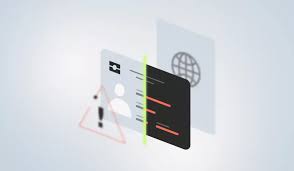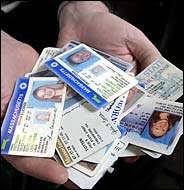What should ISS be on a fake ID
Introduction: Understanding Fake IDs and the Role of ISS
In today's digital age, the production and use of fake identification cards (IDs) have become a sophisticated, multi-faceted business. Whether it’s for gaining entry to age-restricted areas, purchasing alcohol, or bypassing certain legal restrictions, the fake ID market has grown in response to the increasing demand for identity alterations. While the production of these IDs may seem simple on the surface, creating a fake ID that successfully bypasses scrutiny involves attention to various details, one of which is the "ISS" section on the ID. The ISS, short for "Issuance Date," plays a crucial role in the ID's legitimacy, making it an essential factor to consider when producing a fake ID.
This article will explore the importance of the ISS in a fake ID, offering a detailed analysis of its relevance, best practices for its integration, and market factors influencing its inclusion.
Chapter 1: What is the ISS on an ID and Why is It Important?
1.1 Defining ISS: Issuance Date and Its Purpose
The "ISS" on an ID stands for "Issuance Date." This is the date the ID was officially issued by the government or relevant authority. It provides context about the age and validity of the identification card. On legitimate IDs, the ISS date is crucial for verifying how long the ID has been in use and helps authorities detect potential fraud. For instance, in the case of a driver’s license, the ISS date can offer an indication of when the individual was legally allowed to drive.
In the realm of fake IDs, replicating the ISS field accurately is vital for two reasons:
- Authenticity: A well-placed and realistic issuance date makes the ID appear legitimate.
- Pass Verification: Some verification processes check the issuance date to cross-reference with other data, ensuring the person’s identity matches across various government databases.
An incorrect or suspicious issuance date is one of the most common giveaways of a poorly crafted fake ID. For this reason, getting the ISS right is essential for a successful ID that withstands close scrutiny.
1.2 The Role of ISS in Fake IDs
When constructing a fake ID, the issuance date must appear plausible. For instance, if a 21-year-old individual is crafting a fake ID to appear older, the ISS should reflect a realistic timeline of when that person could have received the ID. For a 21-year-old, an ISS date that suggests they received their ID only a few months earlier may raise red flags, whereas a date indicating issuance three to five years ago is far more convincing.
Chapter 2: Analyzing Product Features: What Makes an ISS Realistic?
2.1 Format of the ISS
In most countries, the issuance date follows a standard format, which typically includes the day, month, and year (DD/MM/YYYY). However, variations exist depending on the country or state. In the United States, the format might vary from state to state, with some using MM/DD/YYYY or simply a numeric code. Understanding the specific formats for different regions is critical when crafting a fake ID.
For example, if you are producing a fake ID that is supposed to be from New York, it’s important to know that their issuance date is formatted as MM/DD/YYYY, whereas in California, the format might differ slightly. This attention to detail can make the difference between a convincing ID and one that is quickly spotted as fraudulent.
2.2 Calculating a Plausible ISS Date
To create a convincing fake ID, the issuance date should be calculated based on the individual’s age and the type of ID being forged. For example:
- If an individual wants an ID that says they are 25 years old, their ISS date should reflect when a typical person of that age would have obtained the ID. If 18 is the legal age to get a driver’s license, the issuance date should be about 7 years earlier.
- In the case of IDs like passports or other forms of government-issued identification, the issuance date should reflect realistic expiration timelines. A passport, for instance, is usually valid for 5 or 10 years, depending on the country. A fake passport with a newly issued date might seem suspicious if it doesn’t align with other identifying factors, such as previous travel records.
Chapter 3: Legal Considerations and Risks in the Fake ID Market
3.1 The Legality of Fake IDs
The production and use of fake IDs are illegal in nearly all jurisdictions. In many countries, including the United States, penalties for being caught with a fake ID can range from fines to imprisonment. For those producing fake IDs, the risks are even greater, as authorities often treat this as a form of forgery or fraud. In some countries, making and selling fake IDs is classified as a criminal offense, with severe penalties that could include long-term prison sentences and hefty fines.
While this article focuses on the technicalities of fake ID design, it’s important to be aware of the significant legal risks involved. Those engaging in this practice should understand that any involvement in fake ID production can have lasting consequences, including criminal records and harm to reputation.
3.2 Risks of an Incorrect ISS Date
An incorrectly placed or formatted ISS date is one of the easiest ways for authorities to detect a fake ID. The ISS is often cross-referenced with other data points, and if it doesn’t align with an individual’s legal information, the ID is flagged for further investigation. This can result in immediate rejection of the ID at checkpoints or, worse, arrest and legal consequences for the individual.
Producing a fake ID with a poorly calculated ISS date not only jeopardizes the user but also exposes the producer to greater legal risks. If the fake IDs are consistently detected due to incorrect ISS dates, it could lead to greater scrutiny from law enforcement and higher chances of the operation being exposed.
Chapter 4: Market Analysis: Who Buys Fake IDs and Why?
4.1 Target Audience for Fake IDs
The market for fake IDs is diverse, though it is largely dominated by younger individuals, particularly college students, who use these IDs to bypass age restrictions on activities like drinking, clubbing, and attending events with age limits. According to studies, individuals aged 18 to 21 make up the largest demographic of fake ID users, often seeking IDs that allow them to purchase alcohol or gain access to bars and nightclubs.
Beyond young adults, there are other audiences for fake IDs, including:
- Individuals looking to escape legal constraints: Some individuals use fake IDs to change their identities, particularly if they have a criminal record or want to avoid certain legal responsibilities.
- Immigrants: In some cases, immigrants might seek fake IDs as a way to work or reside in a country without legal documentation.
- Corporate or financial fraud: There are instances where fake IDs are used for more sophisticated criminal activities, such as setting up fraudulent accounts, applying for loans, or creating new identities for financial gain.
4.2 Motivations Behind Buying Fake IDs
The motivation for buying fake IDs extends beyond simple convenience. Here are some of the key reasons why individuals seek out these products:
- Social Activities: Many fake ID users are simply trying to participate in activities from which they are legally excluded, such as purchasing alcohol or attending clubs.
- Avoiding Legal Restrictions: Some individuals purchase fake IDs to avoid legal consequences, like escaping arrest warrants, tax issues, or fines.
- Employment and Immigration: In countries with strict immigration laws, undocumented individuals may seek fake IDs to secure employment or housing.
Understanding the motivations behind purchasing fake IDs helps ID producers cater to specific market needs and craft IDs that meet the expectations of different audiences.
Chapter 5: Design Specifications for a Successful Fake ID
5.1 Attention to Detail: Beyond the ISS
The ISS is just one of many details that make a fake ID believable. A well-crafted fake ID requires attention to several other features, including:
- Holograms: Legitimate IDs often contain holograms that make them difficult to replicate. High-quality fake IDs incorporate similar holographic features to increase realism.
- Barcodes and Magnetic Strips: Many modern IDs contain barcodes or magnetic strips that store data. Including these features, and ensuring they are functional, adds another layer of authenticity.
- UV and Laser Printing: Some IDs feature UV elements or laser-engraved details that are only visible under certain lighting conditions. This level of sophistication can make a fake ID pass even the most thorough checks.
5.2 Customization for Specific Markets
Understanding the specific ID requirements of different states or countries is essential when creating a fake ID. For instance:
- State-specific IDs in the US: Each state in the US has slightly different ID designs and requirements. Some states may feature specific color schemes, security markings, or fonts. A well-produced fake ID must account for these details to avoid raising suspicion.
- Country-specific requirements: International fake IDs need to adhere to country-specific regulations regarding layout, colors, and formats. For example, a European fake ID should meet the design standards of the issuing country to appear credible.
Chapter 6: Trends in Fake ID Production
6.1 Digital Fake IDs: The Rise of QR Codes and Blockchain
With advances in technology, fake ID producers are constantly innovating to stay ahead of detection methods. One of the more recent trends in ID production is the use of QR codes and blockchain technology to enhance security. Some fake ID producers are now incorporating scannable QR codes that link to websites or databases, which appear legitimate to the untrained eye.
Blockchain technology is also making inroads in the world of ID verification. Some fake ID creators are exploring blockchain's decentralized nature to store ID data securely, ensuring that even if a fake ID is scanned, it passes verification tests.
6.2 AI and Machine Learning in ID Detection
As fake IDs become more sophisticated, so too do the methods for detecting them. AI-powered systems are increasingly being used by governments and businesses to detect fraudulent IDs. These systems use machine learning algorithms to analyze thousands of data points and detect inconsistencies that the human eye might miss.
For fake ID producers, staying ahead of AI detection methods requires constantly updating designs, incorporating new technologies, and paying meticulous attention to the smallest details, such as the ISS date.
Conclusion: Crafting the Perfect Fake ID with a Realistic ISS
In the world of fake ID production, details matter. The "ISS" field, or issuance date, is one of the most critical elements in crafting a believable ID that can pass scrutiny. From selecting the correct format to calculating a plausible date, ensuring that the ISS is accurate and consistent with the rest of the ID is essential for success.
Beyond the technicalities of the ISS, a successful fake ID requires careful attention to design features, security elements, and an understanding of market trends and audience motivations. The risks of producing or using fake IDs are significant, and as technology advances, the challenge of creating undetectable IDs will only grow.
For those in the business of producing fake IDs, remaining informed about these trends, and adapting to changing technologies, is key to maintaining credibility in an ever-evolving market.
 security features
security features
 What should ISS be on a fake I
What should ISS be on a fake I
 Utah driver's license
Utah driver's license
 customized fake IDs
customized fake IDs